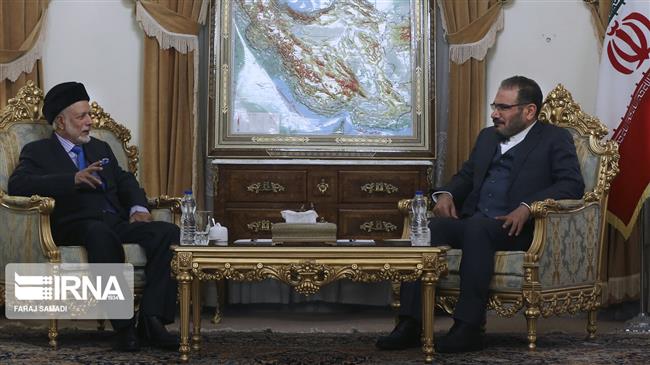“Only those coalitions, which are free from influence and interference of foreigners, can solve problems, restore security [to the region] and last [for a long time],” Shamkhani said in a meeting with the visiting Omani Foreign Minister Yusuf bin Alawi in Tehran on Monday.
The Iranian official’s remarks were clear reference to the failure of the United States in forming a so-called coalition comprising regional and extra-regional states to allegedly protect security of shipping in the Persian Gulf.
On November 7, the International Maritime Security Construct (IMSC), a US-led military coalition in the Persian Gulf, officially launched its operations supposedly seeking to protect shipping lanes near Iranian territorial waters.
The US Fifth Fleet based in Bahrain announced that the IMSC, formerly known as Operational Sentinel, had opened its command center in the country.
Last month, Iran slammed the US move to create a coalition in the Persian Gulf, saying it will only exacerbate insecurity and instability across the world.
“History shows that American coalitions have always been nothing but misnomers, which have not only failed to create security but also caused more insecurity and instability in different parts of the world,” Iran’s Foreign Ministry Spokesman Abbas Mousavi said.
The IMSC launched its operation nearly five months after Washington announced that it was seeking to form a “multinational maritime effort” in response to a series of mysterious explosions targeting vessels in the Persian Gulf and the Sea of Oman earlier this year.
The US and Saudi Arabia were quick to blame Iran for the incidents without providing conclusive evidence.
Washington announced a deployment of 1,000 additional troops in the region following the attacks.
Iran has roundly rejected the accusations, emphasizing its commitment to regional maritime security and its importance in safeguarding international trade.
Elsewhere in his remarks, Shamkhani said, “A country that is not committed to any of its obligations, whether in connection with Iran or in exchanges with other countries, cannot be trusted.”
Those countries, which have played a leading role in creating tension and insecurity in the region and caused chaos by waging different wars and spreading terrorism, have never been after stability and security in the Persian Gulf and only seek to serve their own interests and plunder the region, the senior Iranian official warned.
Stressing that the persistence of the Saudi-led war in Yemen is indicative of the warmongering nature of arrogant powers and their stooges in the region, the official said, “The continuation of this genocide will only serve the interests of enemies of regional peace and security such as the US and Israel, and Saudi Arabia needs to yield to the demands of the resilient Yemeni people to stop posing further danger to regional stability and security.”
Saudi Arabia and a number of its regional allies launched a devastating campaign against Yemen in March 2015, with the goal of bringing the government of former president Abd Rabbuh Mansur Hadi back to power and crushing Ansarullah.
The US-based Armed Conflict Location and Event Data Project (ACLED), a nonprofit conflict-research organization, estimates that the war has so far claimed more than 100,000 lives.
Oman ready to help remove tension in region: Alawi
The Omani foreign minister, for his part, hailed regular consultations between Tehran and Muscat on regional and international issues and said any tension in the region would not be beneficial to any Persian Gulf littoral states.
Alawi added that the establishment of sustainable security in the region calls for consensus among all regional countries and settlement of misunderstandings.
He expressed his country’s readiness to make use of its potential to ease ongoing tensions and prepare the ground for constructive dialog among regional states.
